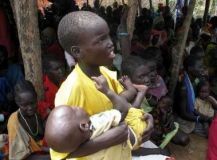South Sudan – Peace is the start of new problems
By Andrew England
Sept 23 2005 (AKUEM, South Sudan) — Inside a sandy compound of grass-roofed shelters, southern Sudanese women line up to receive the first of their two daily meals – a stodgy soya-based mix provided by an international aid agency.
 Some are cradling emaciated, runny-nosed babies; all are barefoot and dressed in tattered clothes that barely cover their sinewy bodies. More infants, their eyes brighter, play with blown-up surgical gloves and empty tins in the dusty grounds of the feeding centre.
Some are cradling emaciated, runny-nosed babies; all are barefoot and dressed in tattered clothes that barely cover their sinewy bodies. More infants, their eyes brighter, play with blown-up surgical gloves and empty tins in the dusty grounds of the feeding centre.
Southern Sudan has been plagued by perennial food shortages for years, crises that were mainly blamed on the 21-year war that ravaged the vast, impoverished region.
The conflict, which claimed 2m lives, mainly through war-induced famine and disease, formally ended in January. But the hunger and much of the misery continues.
Eight months after the government and a former southern rebel group, the Sudan People’s Liberation Army, signed a peace accord, the changes southern Sudanese longed for have yet to materialise.
All agree they enjoy a new sense of freedom; an ability to crisscross former frontlines and to live without fear of armed raids or bombing sorties. But there are few signs of the much-anticipated development in a region bereft of roads, schools and hospitals and where children have a 25 per cent chance of dying before the age of five.
Most of the children at the feeding centre run by Médecins Sans Frontières in Akuem village would have perished without treatment. The aid agency says it is overwhelmed and complains there has been little focus on people’s post-conflict needs.
Donors pledged $4.5bn (?3.7bn, £2.5bn) for Sudan’s reconstruction in April, including $1.9bn for development – but there has been only a trickle of funds reaching the ground.
That and other peace dividends were put on hold because of the separate crisis in Darfur, and Sudan is not on the list of countries in current multilateral debt cancellation plans, which are being discussed at the IMF/World Bank meeting this weekend.
And, significantly, the formation of a southern government that would have provided a concrete indication that the peace process was moving forward has been delayed.
The hold-ups are partly due to the death of John Garang, the former southern rebel leader killed in a helicopter crash on July 30.
Subsequent wrangles between the former rebels and the ruling National Congress party in Khartoum over who should get which ministerial post in a new national transitional government meant the cabinet was only announced this week.
“Every ninth day of the month we have been expecting,” Cleto Akot Dut, the acting district commissioner of Aweil-East county, says with a wry smile.
There is little he can do to reassure villagers who have been approaching him in growing numbers in search of news of what is happening to the peace process: “I say we are waiting for instructions from headquarters.”
Others seem to accept the delays with a sense of fatalism born of years of poverty and conflict. Meanwhile, the burden on the villagers of Aweil-East has increased as tens of thousands of their kin who fled the area during the war have returned from the north. Most come back with few possessions – just extra mouths to feed.
This year’s food shortage abated in recent weeks as sorghum crops were harvested following seasonal rains that turned the arid terrain green. But few expect stocks to last until next year’s harvest, saying the rains were insufficient.
“I was expecting if there was peace it would be comfortable, but now we have got nothing,” says Peter Dut Noon, 22, who returned from a refugee camp. In the camp in Kenya, he had access to clean water, electricity and regular meals. In his village, life evolves around mud huts, boreholes and rickety market stalls.
Supporting returning southerners who fled the war is just one of the huge challenges facing southern authorities and aid groups.
Infrastructure has to be built from scratch, farming techniques have to be modernised and the mindset of a people who have spent years being supported by humanitarian handouts has to be changed.
“Because seeds were given as relief, that . . . becomes an idea that everything should be given free,” says Joseph Brok Maney, of the SPLA’s secretariat of agriculture.
There are also complaints that food aid often fails to reach the needy because of looting and corruption – highlighting the difficulties of working with a former rebel group that has yet to prove it can make the transition to effective government.
Erick De Mul, head of the UN development programme for south Sudan, describes the challenges as “mind boggling”.
“What is important is that everybody, especially the SPLA but also the aid groups, manage expectations,” he says.
(Financial Times)
